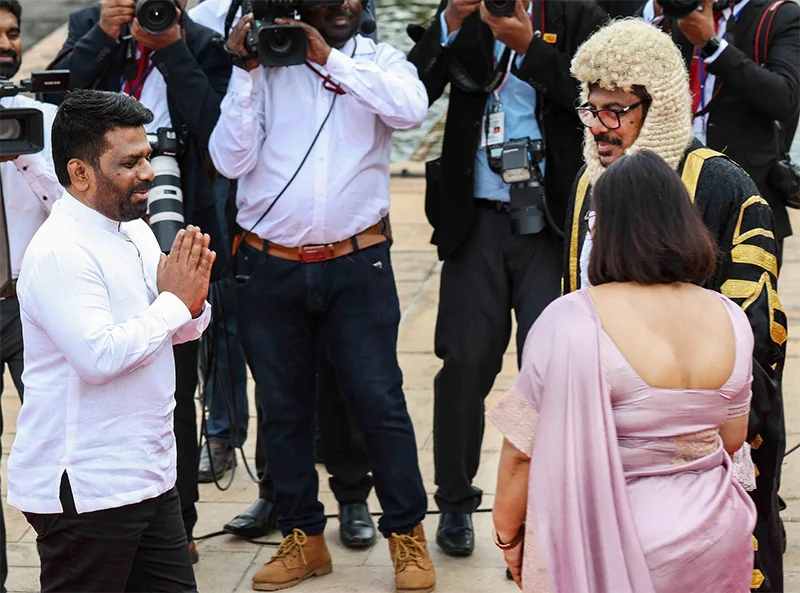The Degree Circus
Posted on December 17th, 2024
Courtesy The Island

File photo of President AKD and Speaker Ranwala(Image courtesy Parliament of Sri Lanka)

‘To prove that degrees, per se, are worthless. Often, they are honorifics of true scientists or learned scholars or inspired teachers. Much more frequently they are false faces for overeducated jackasses.’ – Robert A. Heinlein
It is the above quote that came to mind when witnessing the barrage of information coming out on the saga of the Sri Lankan parliamentary speaker Asoka Ranwala’s PhD qualification, or the lack of it. Of course, true to form, we have outdone ourselves – yet again. In Sri Lanka’s case, degrees are not only the false faces for overeducated jackasses”. Our people who often wear degrees like expensive jewellery are the worst of the uneducated louts, to put it mildly. The fiasco surrounding former speaker Ranwala’s resignation has also brought to the fore one of the most serious ailments our society has been afflicted with for a very long time, i. e. false pretense for social recognition and/or profit, mostly by superimposing degrees or other perceived qualifications on one’s public persona. This is not new, but the recent saga has invited a significant degree of prominence. This is not only due to Ranwala’s recently acquired status as the Speaker and the country’s third citizen but, more importantly, as a result of the moral high ground on which the NPP campaigned and was elected to Parliament with an unprecedented majority.
Soon after my undergraduate studies in the 1980s, I met a friend in Pettah who had studied history at the University of Colombo during my time, but was practising medicine in Tissamaharama. Quackery is part of this same scheme and is better known though it is structurally part of the same cluster of scams. These scams involving non-existent degrees or inflated qualifications usually involve lying to the public. Quite simply, it is a matter of public dishonesty. But politicians and dubious characters affiliated with politics have been the worst culprits in this scam. Sajith Premadas’s bachelor’s degree from the London School of Economics has been an unresolved bone of contention for a long time, and has resurfaced again now. Similarly, Namal Rajapaksa’s Attorney-at-Law qualification (not a degree) from the Sri Lanka Law College after sitting for the final exams in restricted conditions by himself (easily doable under the Rajapaksas) is another well-known case, which also has become part of the debate again. Ironically, both are now asking the present government to cleanse itself of false degree holders! The demand would have been more believable if the Opposition began its war cry by cleansing itself of its most obvious culprits.
The late Eliyantha Lindsay White, heavily sponsored by the Rajapaksas, who claimed to be a doctor with miraculous healing powers, and Viranjith Thambugala’s alleged PhD and teaching at well-known institutions, including at NASA, are among more recent cases. None of these people – from Premadasa to Thambugala – have ever uttered anything sensible that can vouch for their alleged advanced formal training. Nevertheless, they have been allowed to remain untouched, beyond short-lived public outcries, because such fakery is not a crime, but an ethical issue. More importantly, they had enormous political protection. Besides, ethics are of no concern for such people. This, however, was not possible for Ranwala. The question is why not, and what feeds this ailment in our country.
The short answer to what feeds this ailment” is, because of the long-standing importance given to education in our country, in the context of which advanced education and university affiliations are taken very seriously beyond simple professional matters. What these nefarious people from universities and outside are doing is to make use of this broad-based public interest and institutionalized respect, for their own private social and political gain. Up to now, it has been a safe game to play.
Information available suggests that Ranwala does not even have the bachelor’s degree from the University of Moratuwa, which he had initially claimed. In his resignation letter, which itself is a fascinating document, he has claimed that he had not been able to collect the paperwork pertaining to his PhD from Waseda University, Tokyo, but he nevertheless has the degree. But this is late 2024 and not the 15th century. One does not need to send a delegation bearing gifts to the Vice Chancellor of this Japanese university to get the transcripts and authenticated degree certificates pertaining to any former candidate in any degree programme. All that was needed in this case was for Ranwala to make that request himself or otherwise authorize someone else to do it and make the required payment. The information would have come via email in a few days if not a few hours. There is no indication this was ever attempted. If that was done sooner — if the former Speaker’s claims are true — this fiasco would not have reached the heights it did. It also would have saved the government needless embarrassment.
But this also opens another more important question. That is, why did the NPP wait for so long to get their man to relinquish his duties as Speaker, and that, too, with a somewhat non-committal resignation letter, with its spokesperson Nalinda Jayatissa deliberately evading questions by journalists. Some of its Ministers, like Wasantha Samarasinghe and Deputy Minister Namal Karunarathna, went to the extent of issuing an unnecessary threat amidst much bravado that they have the numbers in place (which we the people had given them not too long ago) to defeat any no-confidence motion by the Opposition. What this means is that the NPP was willing to compromise its own ethical standards for the protection of one person and his possible dishonesty. This was not merely a debate over a certificate. More crucially, it is about lying in public to all of us and getting elected because some voters would have voted for him assuming him to be a learned man. I am sure it is this belief in the integrity and the perceived qualifications of its man that the JVP was moved to appoint Ranwala as the Speaker when there were many better qualified people in Parliament to hold that responsibility, but without such dubious baggage.
Ultimately, this is about the confidence in the man, others like him and by extension the government itself. Not just this incident, but the lackluster way in which it was handled by the NPP and the way in which its JVP members at large justified Ranwala’s status publicly and vociferously have only done one thing: it has created a needless rupture in the moral high ground with which the NPP was ushered into power. All indications are, he was protected within the government until it was no longer possible (with an impending no-confidence motion and widespread bad press) because he was an important member of the JVP. None of us are doubting the work he has done tirelessly for years for the betterment of the JVP in considerably difficult times and with risks to his life. But would the same position be adopted if the individual concerned was from another entity within the NPP?
It seems there are many more Ranwalas in Parliament now in the ranks of the NPP. Since the eruption of the Ranwala saga, their degree and professional claims on social media handles and platforms they control have disappeared, opening more questions about their integrity than any answers. These degree claims were also part of their campaign arsenal.
Again, the lead for this was provided by Ranwala himself by discontinuing his LikedIn page as soon as the fiasco emerged.
But to be clear, the incident has so far only dented the government’s moral high ground, and it has not been dismantled – yet. But if the government is serious about maintaining this hard won moral high ground and the trust people had placed in them, then, it needs to clean shop right now. People who have lied during their campaigns claiming for themselves degrees and qualifications they do not have, should be identified via a thorough disciplinary investigation and made to resign or be removed. But not only from their positions in the government but also as MPs. The same applies to Ranwala. After all, we did not vote for them to be Ministers, Deputy Ministers and Speaker, but to be MPs. Needless to say, all this should also apply to similar dishonest people in Opposition if they have any interest at all in reinventing themselves within slightly higher moral standards.
There is no point in arguing as some in the JVP’s public and social media bandwagons have already begun that these are not crimes and others have done it before. We know all this. But we did not vote this government in for it to tread along the same dubious and treacherous path other worse culprits have tread before. That moral high ground that the government once had, and which I think can still be retained, must clearly be retained if it is to do what it promised all of us. But it must be done with effort and sincerity and not with nonsense and bravado. And to do so, we must be shown the government is serious about corruption at all levels. Public dishonesty is the worst form of corruption. This cannot be an excuse for any reason simply because some of the culprits might be their own. For us to be led by elected leaders, we have to have trust in their integrity. If not, what would be the difference between this government and those who came before but were booted out decisively?
I hope the President was serious when he said recently in public that the government will deal with all people appropriately within its ranks if they have done anything wrong. Public dishonesty is ethically wrong, Mr President; it is morally repugnant though it is not illegal. It cannot be an excused for leniency whatever the pressures within might be.
A former student told me recently I should not be too critical of the government as it is doing its best. I damn well have the right and the responsibility to be exactly this: critical but with self-reflection. I voted for the NPP and went public for the first time in my life asking people to do so, too, as we as a country needed serious change. But in that same address to the public, I also said that if the government deviated from its principles we supported, we also had the right to object, come to the streets and look for alternatives. Hopefully, that future will not come. Hopefully, another Gotabaya saga will not come, which fortunately is in the mind of the President, too, going by his many public statements since the parliamentary election victory. The only way to ensure that this government governs effectively and with dignity is to be honest in public, to be honest in private, to be honest in words, and to be honest in action. Personally, I still have considerable hope for this regime. But it needs to call off its over-enthusiastic and unenlightened public bulldogs drunk with the power of victory and majoritarian euphoria and begin to grow up politically and morally and not be caught up in the corrupt politics of the past. They also need to realize, most of us did not blindly vote for the JVP but for the JVP-led NPP. Erasure of this crucial fact would be a serious mistake from which neither the NPP nor the country would be able to recover.